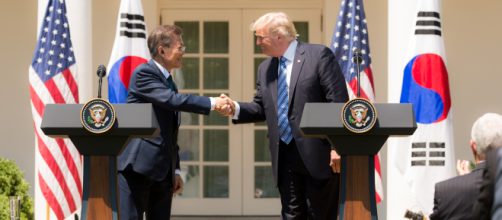Despite the nearly endless stream of breaking news stories clogging up our Facebook timelines, Twitter feeds, and cable news screens, the specter of North Korea continues to loom. It is perhaps the most dangerous of all threats to be countered today on the world stage. However, the thing that makes the situation with North Korea so dangerous is not Kim Jong Un. The North Korean regime has always been a wild card, from Kim Il Sung to Kim Jong Il to the current despot ruling the Hermit Kingdom.
North Korea's threat machine
The bellicose insults and rhetoric emanating from the KCNA, the official propaganda outlet of The North Korean state, are nothing new.
And there is nearly always a certain pattern to these waves of threats. They tend to come both in mid-April during celebrations for Kim Il Sung’s birthday and in mid-August during the commemoration of the Korean peninsula’s liberation from the Japanese following World War II. These precisely timed threats are meant far more for internal propaganda inside the DPRK. Instilling fear and hysteria in their enemies is merely an added benefit.
I lived in South Korea for a total of 40 months between 2010 and 2014. I experienced several of these recurring demands from a belligerent North Korea under both Kim Jong Il and Kim Jong Un. The most notable of these occurred in the spring of 2013, when the North Korean regime officially pulled out from the agreement which had halted the Korean War.
This document was not a peace treaty, but rather a ceasefire. Because of this, the war between the two Koreas is technically not finished; withdrawing from the ceasefire sent the message to the South and its allies that hostilities could ostensibly resume.
The DPRK then warned all foreigners to leave the Korean peninsula for their own safety, although few if any actually heeded this advice.
During this and every other instance of North Korean aggression I witnessed, South Koreans did not dissolve into panic, did not beat the drums of war, and did not demand their government take any kind of aggressive retaliation against their hostile neighbor. Life goes on in South Korea largely as though the DPRK were not there.
Uncharted territory and international relations
We now face two glaring differences regarding the North Korea situation. The first is that the US State Department is severely understaffed. Without a robust and cohesive organization of career diplomats handling global affairs and international crises, the United States has inadvertently chosen to relinquish its leadership role which has been carefully honed over the past seven decades. Secretary of State Rex Tillerson has been undercut and ignored by this president, and most notably by the president’s personal Twitter account.
The second difference, and by far the most obvious one, has little to do with North Korea. While the Kim regime has always been a wild card, there is now a second wild card playing this dangerous game of nuclear brinksmanship.
Every previous president and their secretary of State have dealt with the DPRK using a range of diplomatic measures. They had to do so in order to avoid a conflagration that could consume a large portion of the world. But this president does not follow that protocol set by every one of his predecessors. This president has threatened “fire and fury,” a turn of phrase worthy of the bombastic rhetoric of the KCNA, and not the heretofore measured statements of the Oval Office.
Trump in Asia: South Korea visit
President Trump’s speech before the South Korean National Assembly this week was far more measured and diplomatic than the one he gave before the United Nations in September. However, we have seen before that he has the uncanny ability to swing between attempted diplomacy and presidential rhetoric one day and childish insults and antagonistic threats the next.
It is unlikely that this change of tactic will last in the long term, which is unfortunate. Diplomacy needs stability and a measured hand in order to succeed.
We have two wild cards
Despite the lip service given toward appropriate reverence for veterans symbolized in the American flag and national anthem, it certainly seems as though this administration has not thoroughly considered what might happen to our military and civilians both in the event of war. We do not know much about the current nuclear capability of the North, nor of what quality their weapons might be. While it is probably safe to assume that American nuclear weapons are more advanced than North Korean ones, that does not really matter in the field of battle.
The devastation to both American and South Korean cities and their inhabitants would be unimaginable. The government would likely be forced to reinstate a draft of American citizens to fight in a conflict that most do not support. While the professionals in the military have undoubtedly considered these profoundly unattractive prospects, it is equally unlikely that the president has. Trump is the second wild card in this scenario, and that is something we have never before dealt with. Two wild cards going at it with nuclear weapons in the balance is a recipe for the devastation of at least three nations and the annihilation of a large swath of humanity.


